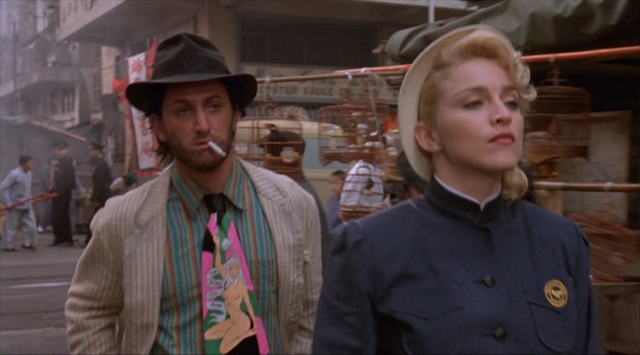
You kids might not know this, but there used to be a very popular singer named Madonna. Her gimmick was to dress, talk, and act like a common street whore, and in so doing, to empower women. (It didn’t make sense then, either, but we went with it.) She was about as big a celebrity as there was in those days, and as is the case with all such stars, she was given the opportunity to appear in some movies even though she was not an actress. To give you a frame of reference, she was the Britney Spears, Paris Hilton, and Joe the Plumber of her day, all rolled into one.
In the mid-1980s, Madonna was married to Sean Penn. Today, of course, Penn is best-known as an Oscar-winning actor and a completely humorless d-bag, but in the ’80s, he was only the second thing. And since Hollywood was busy picking up Madonna with latex gloves and depositing her into movies, they figured hey, why not shove Sean Penn into one with her?
All that remained was to find a high-quality screenplay with parts just right for Madonna and Sean Penn. But since no one had written a movie about a Tijuana prostitute and her abusive boyfriend, they had to settle for “Shanghai Surprise.”
The film is set in the 1930s, when the Japanese occupied Shanghai, which you learned about in your high school history class if you went to high school in Japan or China. First we meet two guys who are not Sean Penn and Madonna, but who are involved in acquiring and distributing opium. They run afoul of the Chinese police, which results in a booby-trapped money belt exploding and blowing off a cop’s hands. You might say the explosion “disarmed” the cop, except it was only his hands, not his arms, so that would be a stupid pun.
Then it’s a year later and we meet Madonna. She’s playing a prim Christian missionary named Miss Tatlock who’s trying to find a batch of missing opium in order to make morphine to ease wounded soldiers’ pain and suffering. (I gave the police the same story about my stash of crystal meth.) She and her elderly missionary supervisor don’t speak Chinese, which is making it hard to find the guy they’re looking for, since the residents of Shanghai are notorious for being Chinese-speakers. Seriously, you can Wiki it. To help in their quest, they hire a drunk American loudmouth named Glendon Wasey (Sean Penn) who has become fluent in Mandarin after years of being thrown out of bars and arrested by no-handed police. One assumes he has also picked up phrases that will be useful in locating opium dealers.
Miss Tatlock does not approve of Mr. Wasey’s crass, loutish ways, and it’s very bizarre to see Madonna in a role that requires her to disapprove of things. It’s like Lindsay Lohan doing a public service announcement about the importance of underpants. Tatlock and Wasey spar in a manner meant to suggest Katharine Hepburn and Cary Grant, or Doris Day and Rock Hudson, but that is more reminiscent of Anita Bryant and Dane Cook. The filmmakers seemed to believe that merely putting Penn and Madonna together in front of a movie camera would be enough to generate electricity. They neglected to factor in Madonna’s wooden screen presence and the dearth of wit in the screenplay. “It practically writes itself!” is a common expression, but it should not be taken literally.
Tatlock and Wasey figure out that one of the guys from the first scene, Faraday, had a Chinese mistress who might know where the opium is now that Faraday is dead. Presumably Faraday bequeathed it to her in his will. The mistress, a courtesan who works at a brothel, is named China Doll, which seems strange because, what, that name wasn’t already taken? That surprises me. Anyway, Wasey goes to see her, but instead of finding out about the opium, he accidentally has sex with her. You may recall that the same thing derailed the first NATO conference.
Then there’s a series of scenes where Wasey doesn’t want to help Tatlock anymore, and they split up, but then they’re back together, and then she’s mad at him, and they fight, and she leaves, but then she returns. Or something. It ends with Tatlock finally using her feminine wiles and having sex with Wasey in order to persuade him to help her, which I suspect was Madonna’s contribution to the story. (“How ELSE would a woman get a man to do something?!”) In the end, they find what they were looking for (opium), as well as something they weren’t looking for (crabs), as well as something else they weren’t looking for (love).
In closing, dear young people, be glad that Madonna has receded into the mists of history, never to be heard from again. While she was entertaining as a performer, with her catchy music and conical breasts (a birth defect since remedied by surgery), her silver-screen efforts made one wish for the glory days of Olivia Newton-John. It’s been 15 years since she was remotely relevant to the modern world — last anyone knew, she was working at a JCPenney in Detroit — and this is something for which we should be grateful.
— Film.com





